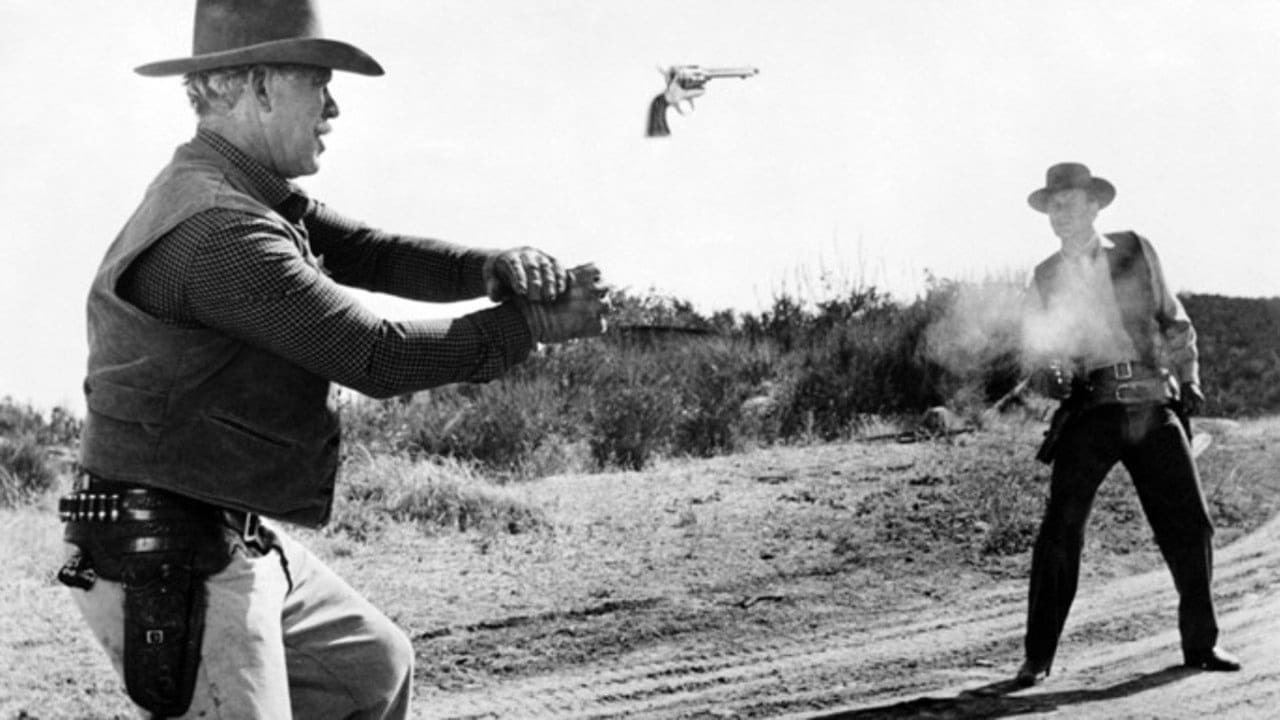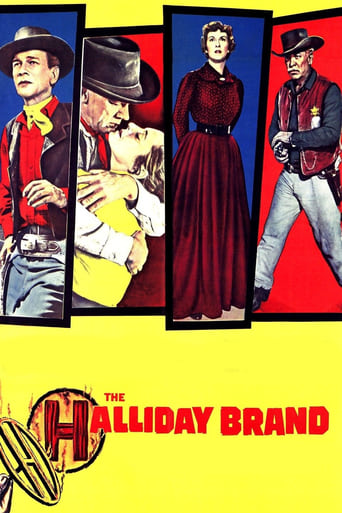

The greatest movie ever made..!
... View MoreA different way of telling a story
... View MoreThe film makes a home in your brain and the only cure is to see it again.
... View MoreExcellent characters with emotional depth. My wife, daughter and granddaughter all enjoyed it...and me, too! Very good movie! You won't be disappointed.
... View MoreApart from some of the singing, I enjoyed "The Halliday Brand" quite a bit. While I am not normally a huge western fan, the Oedipal style story is timeless.When the story begins, Martha (Betsy Blair) is carrying on a covert relationship with a man who is half American Indian. Her father, Big Dan (Ward Bond), is a bigot and so she's been hiding this from him. When he does find out, he's predictably furious...but what happens next shocks everyone. Soon Big Dan stirs up the locals and the boyfriend is murdered. Big Dan's son, Daniel (Joseph Cotten), is furious and naturally blames his father. But Big Dan isn't finished....his infamy seems to know no bounds. Soon, however, he's pushed Daniel so hard that Daniel makes it his life's work to destroy the man.In many ways, this reminds me of one of the greatest westerns, "The Big Country". This film also is about the father-son relationship as well as two patriarchs who are too proud to bend in any way. Both should be watched...just try to ignore the moaning lady 'singing' some of the music...that "The Halliday Brand" could do without!
... View MoreTHE HALLIDAY BRAND 1957 This high-octane, emotion packed 1957 American western, stars, Joseph Cotten, Ward Bond, Betsy Blair, Bill Williams, Jay C. Flippen, Christopher Dark and the gorgeous Viveca Lindfors.The film, which is told in a long flashback, revolves around the family of a powerful rancher played by Ward Bond. The man has carved out one of the biggest ranches in the area. He is also the local town's Sheriff. When Bond's daughter, Betsy Blair, takes up with a local half breed, Bond breaks up the relationship.The lad, Christopher Dark, is then arrested on suspected murder and rustling charges. Bond's son, Cotten does not believe a word of it and accuses Bond of bigotry. Bond's other son Bill Williams, is the town deputy. He fails to protect Dark when a lynch mob comes for the lad. The mob strings up the boy.Cotten rides to town to talk with Dark's father, Jay C. Flippen and sister, Viveca Lindfors. Flippen soon grabs up his rifle and goes looking for Bond. This does not end well for Flippen. The handy with a gun Bond plants Flippen with several well placed rounds.Now there is a big falling out between Bond and son Cotten. Cotten starts a campaign of destruction against Bond and the other ranchers. He tells all that his father, Bond, must end his reign as the only law around. Bond rustles up a posse and pursues his son into the brush country. Cotton however manages to stay one step ahead. Cotton and the pretty Lindfors also manage to work in a little tongue wrestling time into the chase.Matters come to a head when Bond gets sick and is on his deathbed. Or so everyone thinks. It is a play by the old arse to lure his son back. How does it end? You need to watch it, but rest assured it will be worth your time.This top flight potboiler was directed by the under-rated, Joseph H. Lewis. Lewis knocked out several excellent b film noir and westerns during his big screen years. These include, SO DARK THE NIGHT, MY NAME IS JULIA ROSS, GUN CRAZY and THE BIG COMBO. His westerns include A LAWLESS STREET, 7th CAVALRY and 60 or so episodes of series like, THE RIFLEMAN, THE BIG VALLEY, A MAN CALLED SHENANDOAH and BONANZA.The sharp look of the film is supplied by 7 time Oscar nominated and 2 time winning cinematographer, Ray Rennahan. His film work includes, FOR WHOM THE BELL TOLLS, DUEL IN THE SUN, 7th CAVALRY, A LAWLESS STREET, WHISPERING SMITH, (the film) STREETS OF LAREDO and THE PALEFACE.
... View MoreWell there's certainly enough hate to go around in this picture, with the theme explored from various vantage points by director Josph Lewis. I've seen Ward Bond in a wide range of roles, mostly Westerns, but this is by far his most compelling performance. He's a character who just won't let go, and in turn, forces his own son to become a virtual mirror image of himself. The Halliday Brand is symbolized by various signposts along the way - the tree stump axe, Daniel's (Joseph Cotten) usurpation of the family trademark in the cattle stampede, and none more searing than the senior Halliday's declaration in my summary line. For he's willing to fight to keep his family blood line untainted by inter-racial marriage which threatens on two fronts. Daughter Martha (Betsy Blair) has sacrificed her entire life to be suffocated by the Halliday Brand, and when her betrothed is murdered by a lynch mob, brother Daniel takes up the cause to vindicate his death. Standing on the sidelines is brother Clay (Bill Williams), unable to prevail in the name of reason on either side. The emotional pitch gets intense as Daniel resorts to lawlessness and violence to confront his father's arrogance. It's not a comfortable picture to watch, made more harrowing by the absence of any breaks in the tension. The story never sets the viewer up for a reconciliation, and on that score it succeeds, as the Hallidays are finally left broken and dispirited by the paths they have chosen.
... View More'The Halliday Brand' is the penultimate film by cult B-movie meister Joseph H Lewis. He began his career with some anonymous oaters, before first arousing attention with the taut thriller 'My Name is Julia Ross'. He then progressed to the heights of 'Gun Crazy', and 'The Big Combo', and aptly concluded his career with some more Westerns including the bizarre, final 'Terror in a Texas Town'. Since it was 'rediscovered' in the 80's, his work has been admired by luminaries such as Godard and Bogdanovich.'The Halliday Brand', is among the best of his Westerns, displaying many of the hallmarks of Lewis' most successful work. Even so, it remains less well known than his more celebrated noirs. Perhaps this is because while they test the boundaries of genre with formal experiments - the robbery shot from the back of the car in 'Gun Crazy', or the deaf-aid death scene in 'The Big Combo' for instance, 'Halliday' remains intense but more conventional, less dynamic. (Having said that, the use of a flashback in a Western still seems a novelty.) In addition, its social concerns seem less urgent than they once might have done.At the centre of the present film is Big Dan Halliday, played by Ford veteran Ward Bond. At its heart, the touchy issue of miscegenation, and familial/racial pride. In the decade or so after the film's appearance, the issue of racial segregation was to become a key note of the burgeoning civil rights movement. The marriage of blacks to whites was still illegal in several states. The fact that Lewis' film tackles such bigotry head on is a testament to its bravery and, in some respects, to Lewis' integrity as a film maker. The impact of the film is made the greater by the fatherly presence of Bond/Big Dan. A close friend of John Wayne, Bond's well known real life political conservatism gives his role significantly more impact. In fact this may be Bond's best film in a major part, although his blustering sensibilities had been familiar and effective down the years as supporting actor or heavy.As the estranged son Daniel, Joseph Cotton gives an effective account of himself, although the urbane persona of the actor seems slightly jarring on the open range. He is perceptibly more at ease as a failed Western writer (Holly Martins in 'The Third Man' (1949)), than Western hero per se. (Cotton was used to much better effect in the genre by Corbucci a few years later, in the spaghetti 'The Hellbenders/Il Crudeli (1966)). Daniel's search for justice is a little too civilised, less wrathful than vexed. A comparison with the wronged, vengeful Glenn Ford in a film like 'The Violent Men', Maté's 1955 Western, illustrates the point. Ford's character is bitter, sacrificing, calculating and cold; Cotton's is almost apologetic as he sets to work robbing and burning to bring his proud father to his knees. But Cotton has undoubted elan and class as an actor, partly due to his association with Orson Welles (in fact his next role was as the doctor in 'Touch of Evil'). Bond and he make for a fascinating pairing, never uninteresting as they play off each other.Daniel's romance with the indian Aleta is an ironic one; her brother and father have been killed directly or indirectly by Halliday senior. She is naturally drawn to the kindly son who takes issue with the crimes vested upon her family, until she "can't take her eyes off him". The earlier, doomed, dalliance between Jivaro and Martha thus proves the soil in which a new love can sprout. Although there is no doubt that the earlier match would have been a secure one, one feels that Daniel and Aleta's union, born in adversity, will prove the strongest.The Halliday 'brand' of course has more than one meaning. Literally, it refers to the mark on the hide of cattle, or the distinctive (and phallic) axe-in-the-log symbol, prominent twice within shots: at the start of the film, then at the end. (Daniel uses his own form of this brand to indicate his rebelliousness.) But, especially for Big Dan, the 'brand' has a more profound significance: that of personal honour, reputation, and specifically the undiluted nature of the family blood. "The Halliday Brand stands for a lot of things" he declares at one point; ironically his own bigotry and aversion to inter-racial marriage in the family means the brand is something unpleasant and continuously narrowing. For Daniel, of course, the 'brand' is that of shame. That of his father's dubious law enforcement methods in general, and his racist injustice in particular.Lewis' film is distinguished by several long, one-take scenes. The opening camp side interview between Daniel and his bother Bill; the extended love scene between Jivaro and Martha (which recalls the 'wedding fantasy' scene of Ray's 'Johnny Guitar' (1953)), or the relaxed bedroom scene between Daniel and his father. Through this lack of cutting the intensity of events, as in the climactic confrontation at the feet of the newly hanged and cut down Jivaro, is heightened. Long, or continuous, takes can be very liberating for viewer and actor. Characters are free to move around the view plane, the audience's eye choosing to follow them or not, without the 'artificial' emphases of close up or reaction shots. It's a uncluttered style, involving some planning, open to more risks in shooting. The economy and expressiveness which results is very characteristic of the director - as is the awareness of fore- and background space, and expressive camera movements.As a B-film, 'The Halliday Brand' betrays its origins. Apart from the old stagers Bond and Cotton (and the ever reliable C Jay Flippen in a small part) the acting never really rises above adequate, and an over-emphatic musical score (a wordless soprano whenever Dan and Aleta meet, for instance) is sometimes intrusive. But it is a taut, intelligent film, and one which can be recommended to admirers of this director.
... View More